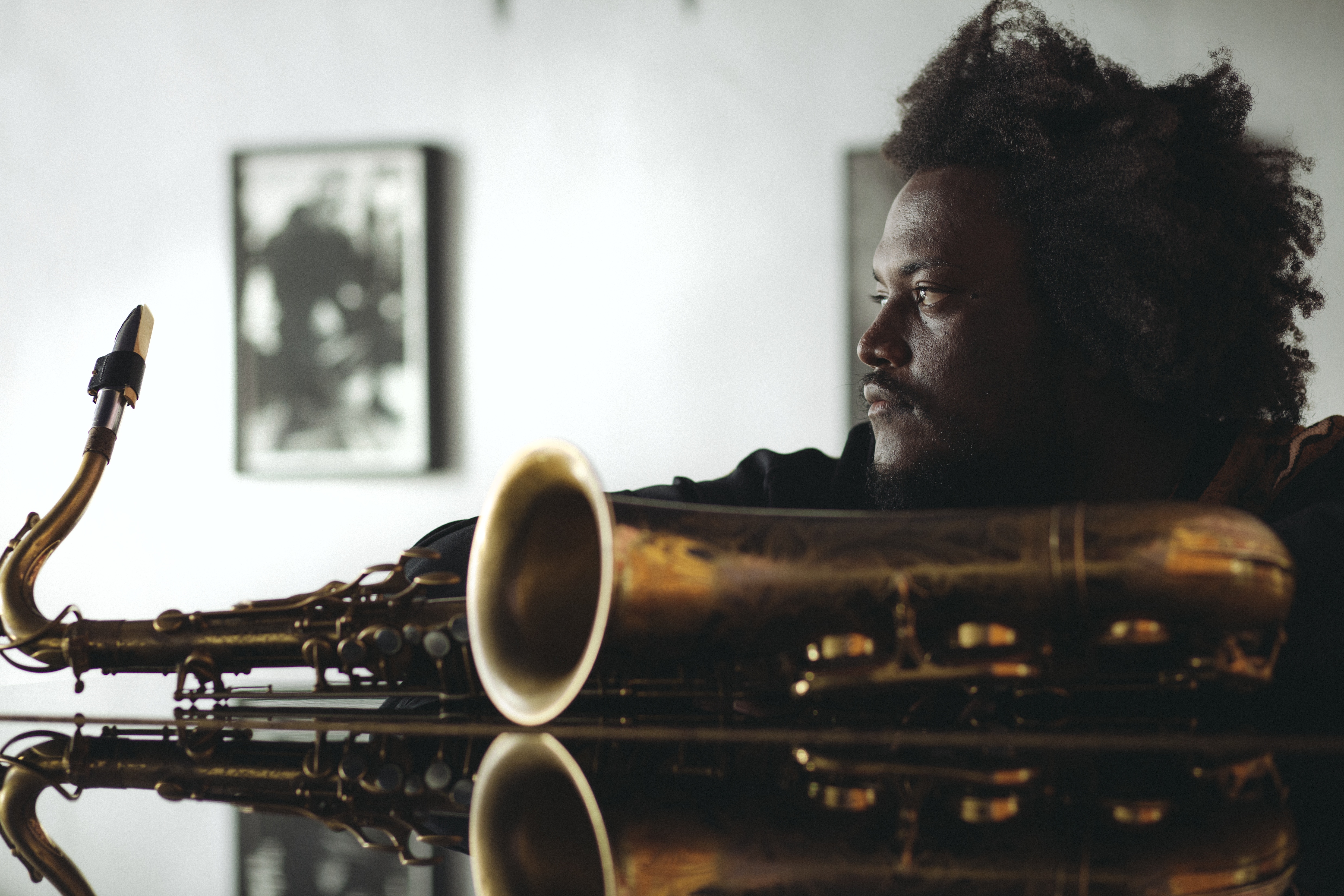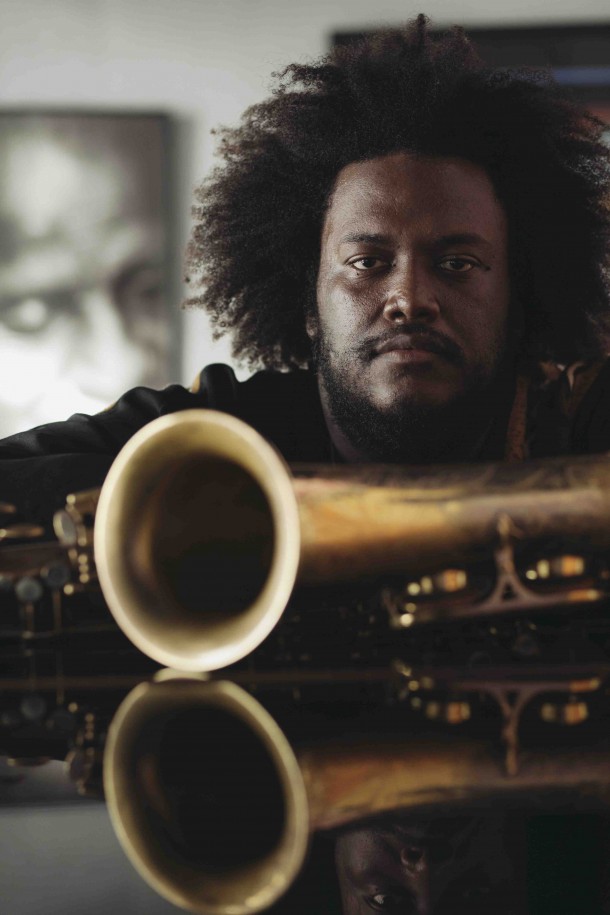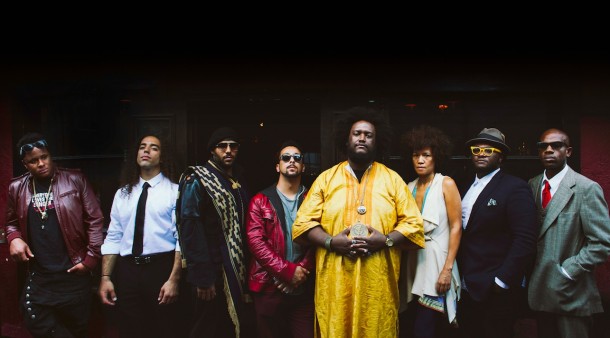



As JC, he waited to be 33 to reveal his talents to the world. Born in Los Angeles, the saxophonist was brought up in a musical environment and began his professional career with new millenary. He has since played with numerous musicians, in various styles. In the Gerald Wilson big band, who was a guide for him, and with leaders such as Stanley Clarke or Raphael Saadiq, but also with Snoop Dogg or Lauryn Hill. During all those years, he took his time to find his own voice. His sound, a true singularity who is nevertheless reminiscent of his elders. A well-known partner of singer Kendrick Lamar, friend of bass player Thundercat, Kamasi Washington has now achieved fame of his own with his astonishing debut solo record, released by Braindfeeder, Flying Lotus’s label. Consisting in more than 3 hours of music, in a boxset of 3 LPs, the totemic ‘Epic’ finally puts this composer on the frontline. No doubt, a new Jazz star is born!
Photos by Mike Park
You grew up in Los Angeles what did you listen to as a teenager?
So the answer to this question is a little complicated because in my early teenage years is when I started to take music really seriously and I was kind of all over the place. I was really into Hip Hop and RnB from my earlier childhood, I had already liked jazz but by then I was really into it, I was also getting into European Classical music because of new friends I was making at my high school which was a music academy. So I was listening records like Snoop Dogg’s “The Doggfather”, Tupac “All Eyez On Me”, Nas “It Was Written”, Busta Rhymes “When Disaster Strikes”, Lee Morgan “The Gigolo”, John Coltrane “Transitions”, McCoy Tyner “The Real McCoy”, Eric Dolphy “Out to Lunch”, Stravinsky’s “Rite of Spring”, Prokofiev’s “Romeo and Juliet” and a lot of other stuff.
When did you start music? Why saxophone?
My father is a musician so I started music very young at around 2 on drums, then around 5 I started playing the piano, then clarinet at 7. When I was around 11 or 12 I got really into Art Blakey’s The Jazz Messengers. My dad who is a saxophone player wouldn’t let me play saxophone because he wanted me to learn clarinet first. In fact he told me that they were the same and if I couldn’t play the clarinet then I wouldn’t be able to play the saxophone. So by 12 I was really trying to play songs from my favorite jazz records all of which had saxophone players. So the clarinet is similar to the saxophone but it’s not the same at all but I didn’t know that so I was trying to learn this music and it was so hard to try to play Charlie Parker solos on a clarinet and have them sound like he did. So one day my dad left his soprano sax out and I took it and from the first note I was already better than I was on clarinet. It was crazy because I didn’t even really know the fingerings but I instantly figured them out and I had been listening to so many saxophone players that I already sounded like one. There was no going back for me at that point my dad had to give in. It was kind of surreal.
What were/are your mentors? References?
My first and biggest mentor is my father Rickey Washington. He started me in music and has guided me my whole life. But I’ve learned a lot from many different people. After my father I would say a man named Reggie Andrew’s was my second biggest mentor. He was also my father’s teacher and a staple educational figure in the African American music community of Los Angeles since the 70s. Everyone in my band and most of the musicians that are really doing a lot in music in Los Angeles come up through him. Then there was the great Gerald Wilson who was one of Reggie Andrew’s heroes. I started with Gerald very young and played with him for almost 15 years and learned so much about the history of jazz, he was born in 1918 so he was there first hand. All of my idols were his friends. Harmonically he was my biggest influence so much of what I play comes from all those years hearing the dense one of kind harmonies he wrote for hi big band. There are literally dozens of others that I can and probably should mention like Issac Smith, Stanley Clarke, Harvey Mason, plus many many more but my dad, Reggie, and Gerald are my top 3.

Cherokee
What is the influence of Gospel and Soul in your music?
I mentioned earlier that when I first picked up the sax the connection was instantaneous. So literally that next Sunday my dad took me to play at my uncle’s church. My uncle played organ and piano. So my dad still hadn’t taught me the fingerings though I had figured most of them out by my self. Before this my dads approach to teaching me was very technical we would read every thing and used a lot of method books but when I switched to sax he wanted to develop my ear so he took me to church to play gospel. I grew up going to church so I knew all the songs but hadn’t played any of them before. So I had to use my ears and figure everything out. It was a little hard at first but after a while I could play any song that I could sing in my head. So you can say that I really learned how to play music through gospel. And I’ve always played gospel and I still to this day play at church.
Is there a specific California sound, for jazz or hip hop? If so how would you define it?
Though there is a vibe to the State of California as a whole but it’s too big to speak of one sound for it there are lots of sounds. Even my City of Los Angeles is really big and there are lots pockets that each have their own sound. The sound that many people are now starting to recognize is the sound from an area in south central Los Angeles called The Leimert Park Village. There is definitely a very specific sound from there. This sound really derives from all over south central, and the east side of Los Angeles but Leimert is the hub. That sound that you here on my album and the jazz elements of Kendrick Lamar’s To Pimp A Butterfly comes from Leimert. That’s where myself and everyone in my band came up plus people like Terrace Martin and Issac Smith came up there too. It’s the center of African American Culture in Los Angeles. Growing up there we had three clubs that we went to. The World Stage, a club that jazz great and LA native Billy Higgins started. 5th Street Dicks the late night heavy modern jazz club that bands like Black Note grew out of. And Project Blowed a underground hip hop club that spawned groups like Freestyle Fellowship. We went to all of them all of the time. So the jazz from that area has roots in the classic forms of jazz from the world stage with a modern fire behind it with large influences from hip hop, RnB, and funk plus there’s an avant garde legacy left by masters like Horace Tapscott that’s mixed in there too.
You recorded three records in three years. Why such an emergency? What did you have to say?
So being a musician of a certain caliber a demand will grow for your services. Myself and everyone in my band were always gigging and going on the road. However at first and for a long time at least for me it wasn’t in jazz. My first tour was with Snoop Dogg and I stayed with him for years. Then my next big gig was with Raphael Saadiq and then Lauryn Hill. I love all styles of music and really enjoyed playing with all three of those legendary musicians but jazz was where my heart was. But during this time the only time I played jazz was in LA when I got home off the road. The same was true of many of my friends so we started recording and writing and playing as much as we could. I was making pretty good money so I built a recording studio in the back of my house. And I made a few records. The first two were just to document what we were doing musically. The gospel record I made for my grandfather as a present. I didn’t really push any of the records out but I had to make them to keep myself intact.
Do you feel you have evolved in terms of aesthetics during the last ten years ? more on the saxophone or in the compositions?
Yes I’ve grown a lot on the saxophone and in composition. First there’s so much music that I’ve been exposed to over the last ten years that has inspired me in my own music. Then on the saxophone I’ve come to a place where I truly except who I am and I am able to play what ever comes to me instead of feeling the need to prove who I am. It sounds really subtle but it’s a really big difference so often musicians get in their own way because they want to show that they can do this and that, and they know this and that. So they end up just playing this and that and never get to what really inside of them. It’s difficult because there’s the need to hone in your skills and a pressure to show that you have skills before other musicians will accept you. But I’ve learned to look past all of that because the greatest music that I will ever be able to make is the music that comes from my heart. In composition I’ve evolved in the size and scope of my ambitions. I no longer limit myself in what I hear in my head I just write it and figure out how to make it happen later.
You play the sax a lot on this record but in the end the listener gets to meet a new composer, a real author. How do you deal with this double hat?
Well the only real difficulty is that there are only 24 hours in a day. So what ends up happening to me is my focus becomes seasonal. So some weeks and even months at times I’m just really into the sax and I’m developing different aspects of the horn or different concepts of things I can play. Then some times I’m really inspired to write and music is just flowing out of me. And I like it this way because sometimes you need to step away from things to get a good perspective I feel that when I step away from the saxophone to compose when I come back to my regiment on the saxophone I’m rejuvenated and excited to get back in with a fresh perspective. And when I haven’t composed in a while I feel like the music that come is fresh and uninhibited by things I’ve already done.

Re Run Home
How long have you been working with The Next Step?
Is a band I started about ten years ago but it comes from a collective we now call the West Coast Get Down. The West Coast Get Down are a group of musicians that I’ve been friends with my whole life. They are Ronald and Stephen Bruner, Cameron Graves, Miles Mosley, Ryan Porter, Brandon Coleman, Tony Austin, and Patrice Quinn. We’ve been making music together our whole lives. I’ve known Ronald since I was three and Stephen since he was born, their dad and my dad played together. Brandon went to the same elementary school as Ronald and Stephen we met almost ten years before he started playing piano. Tony Austin is a little older than us but he went to the same school and we met him at the same time. I met Ryan in junior high in a program called Jazz America and I met Miles and Cameron in high school. I met Patrice Quinn last in my first year of collage. So we’ve been together a long time.
How did you record? Is it the music sum accumulated for seven years?
So about three years ago all the members of The West Coast Get Down decided to take a whole month off from doing any shows or tours and just focus on each other and record each others music. So we were in the studio 7 days a week from 11am-2am for thirty days. And we recorded an incredible amount of music like 190 songs, 8 albums, almost 2 terabytes of music. So I walked away with 45 songs recorded! My new album The Epic is made of my favorite tracks from that 45. For my music the whole band, two drummers, upright bass, electric bass, piano, keyboards, sax, trombone, and trumpet all recorded together in the same room. I wanted everyone to feel free to be spontaneous. If you try overdub then everyone is locked to what ever you record first. I encouraged them all to be as open as they wanted and to shape the music as they heard it. Then for the nine tracks that have strings and choir I wrote that music around what the band had already recorded. I felt like I would get the best of both worlds that way. I could the arrangements be as rich and full as I wanted them to be without limiting the spontaneous creativity.
Your universe reminds us a lot of Horace Tapscott, your California elder.
Yes I love Horace Tapscott! I love his music, his philosophies, and everything he did for the community that I grew up in. I only got to play with him once when I was really young at jam session at The World Stage. But his band The Pan African Peoples Arkestra has continued after his death under the leadership of Michael Sessions and I’ve played with them many times. Yes I’m a big fan all the records that came out on Black Jazz Records. They were really popular in LA and very important to that sound of Leimert Park that I talked about earlier.
How is the crossing of the jazz epic?
The Epic is doing very well so far people are really into it! I hope to bring as many of the members of The Next Step and The West Coast Get Down on the tour as I can. I hope we’re able to bring this music all over the world. I feel like the music we are making speaks to people in way that has been missing for a while. In LA we play at non-jazz clubs all the time for people who if you asked them before the show if they liked jazz they would say absolutely not but after they’re so into it they fighting to try and figure out how they can get more of the music. So we want to go out and share this all over the world. Hopefully it will happen.
How/when did you sign on Brainfeeder?
I meet Flying Lotus a long time ago when I was like 17 I won the John Coltrane competition and he was there with Ravi Coltrane. I think he was like 13 the same age as Thundercat who was playing with me. I think he and Thundercat stayed in touch. I didn’t see Lotus again till about 7 or 8 years ago. I knew that he and Thundercat had been working together and we randomly ran into each other at a jam session. Then a few years later he asked me if I’d like to do a record on Brainfeeder and I was like YES! Being on Brainfeeder has been great. It has definitely given me a lot more exposure and introduced me to a wider audience for sure but more than that it was cool because Lotus encouraged me to do what ever I wanted and that opened my mind to it’s self.
(this interview was published on a shorter version in French, for Jazz News Magazine)
His website, with european tour dates (november 15th, Paris Le Trabendo)
His Top 5